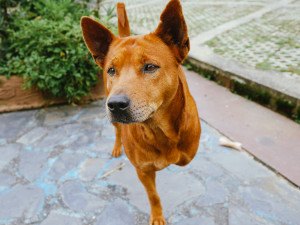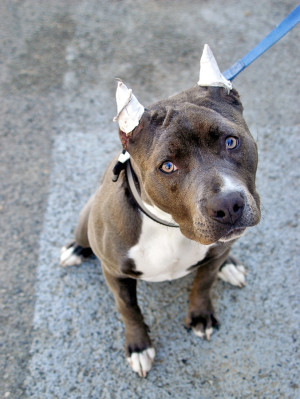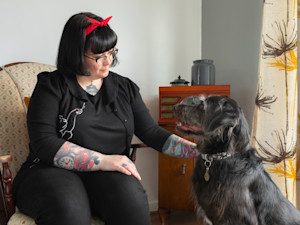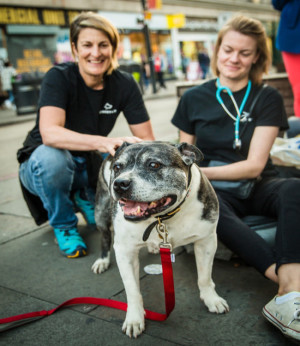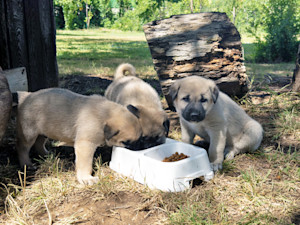Here’s What’s Been Happening To Turkey’s Stray Dogs Since The ‘Massacre’ Law Passed
It’s been nearly a month since Turkey passed the ‘massacre’ law that many feared would lead to a mass culling of the country’s beloved street dogs – here’s what’s been happening since
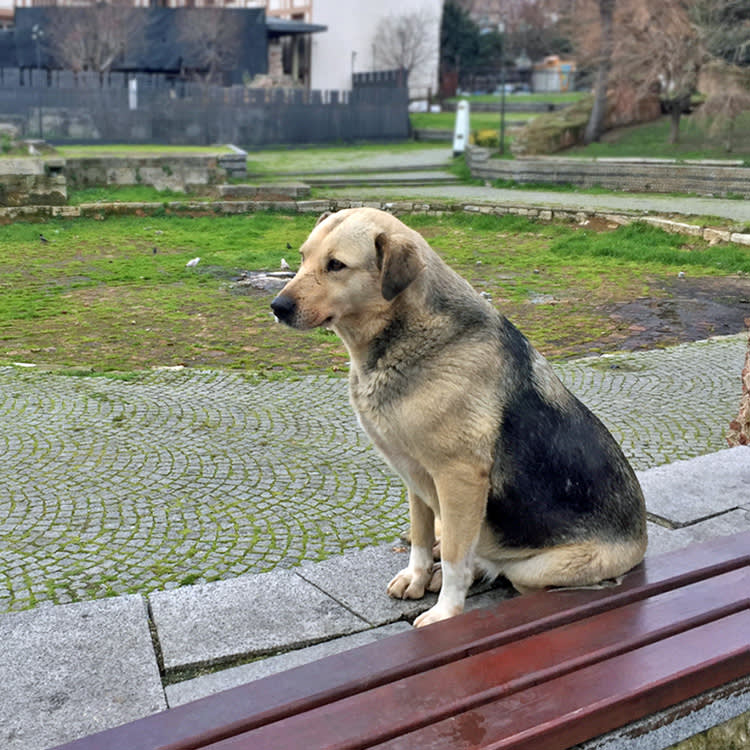
Share Article
Trigger warning: this article contains links to videos of animal cruelty.
Since the passing of new Turkish legislation – deemed as the ‘massacre law’ by activists – at the end of July, pictures and videos have been shared on social media revealing the scale of abuse towards stray dogs; and it’s exactly what activists warned of when the bill was being debated.

Get (totally free) deals for food, treats, accessories, tech and way more pet parenting must-haves.
The new law, introduced by President Tayyip Erdoğan in response to concerns about the estimated four million stray dogs in the country, mandates that municipalities will have to collect stray dogs and house them in government-run shelters where they would be neutered and spayed. Dogs who are terminally ill, pose a health risk to humans, or are aggressive will be euthanised under the law.
When the legislation passed at the end of July, activists feared that dogs would be killed as shelters wouldn’t be able to house the overwhelmingly large number of dogs on the streets.
“The new law sends a clear message to street dogs and to those who look after them,” a post opens in new tab from the charity Animal Friends of Turkey reads. “You’re on your own, the government doesn’t care about you.”
It continues, saying the law is “essentially a free pass for anyone wanting to create problems for street dogs”.
Now, only a month after the law’s passing, there are imagesopens in new tab and videos opens in new tab swirling around on social media of mistreated dogs and mass gravesopens in new tab preparing for their impending deathsopens in new tab. Photojournalist Tunahan Turhanopens in new tab has been documenting the grim reality of what is happening on the country, as well as the impact on animal rights activists and locals on Instagram.
Are the reports true?
“Most of it is true,” Ahmet Kemal Senpolat, a lawyer and president of Animal Rights Federation in Turkey (HAYTAPopens in new tab), says about the posts circulating on social media. “We keep receiving news of ill treatmentopens in new tab or killing from different parts of the country.”
Municipalities, according to Ahmet, are now “fearless” and “bare faced” because of the law.
“They are doing anything they can do to get rid of the surplus of dogs,” he says. “They are and will be committing more violence against dogs under cover of collecting street animals for public health and safety. Their cruel actions are varied: picking up animals from their own area to throw them in the middle of nowhere, poisoning them after collecting, squeezing the dogs into tiny holes called shelters, and killing them inside or outside those shelters.”
Lisanne Hilley, a 34-year-old activist living in Aydın, Turkey who runs Melezopens in new tab, a private shelter for more than 70 dogs and partners with Animal Friends of Turkeyopens in new tab, says she is worried about what is happening in areas where there aren’t animal lovers.
“We only know what is going on in areas where there are large and strong enough groups of animal rights activists to diligently observe what the municipalities and shelters are doing,” she says. “We are in the dark about what is happening in areas where there aren’t people to track what the authorities are doing.”
She has been told of mass gravesopens in new tab found in different parts of Turkey, ready for a surplus of dogs. Even before the new law, she suspects these mass graves were being made use of as the poor conditions of Turkey’s shelters meant that dogs were dying daily in shelters of starvation, illness or injury. She expects they will be filled faster now.
“New dogs are definitely being killed, but to what extent this is more than how things were before is impossible to verify,” she says. “Many of the bodies of the dogs found in the mass graves appear to show signs of brutal violence, but again, as neither the shelters nor the municipalities are under any obligation to truthfully report what they are doing, all we can do is speculate what horrors those dogs went through.”
Lisanne confidently says that cases of animal abuse on the streets have increased.
“For the portion of the population who doesn’t like dogs, the new law is being seen as a free pass to do whatever they like to strays,” she says. She believes that cases of mass poisoning of street dogs by citizens have increased.
Ahmet worries all of this is simply for political purposes – that’s it’s being done “just to win the locals’ approval for less strays.”
“It’s a sign of improved public health and smaller burdens on the public budget,” he continues. “They do not care about their methods for the sake of pleasing some citizens. No matter how unjust or inhumane they are, they can come clean with one blurry justification: the dogs were dangerous.”
How do locals and tourists feel?
Just as there was a split of opinion when the law was being debated, the public is split in the aftermath of its passing.
“On one side, there is the majority of the public which opposes the massacre law,” Ahmet says. “On the other side, there is a heterogenous group of animal massacre fans.”
Those who oppose the law are frustrated and anxious, desperately trying their best to keep dogs alive and healthy.
“Private shelters and animal lovers who don’t have a shelter are desperately trying to look for ways to keep their beloved strays safe,” Lisanne says. “There have been some heartwarming stories of owners of unused plots of land offering the land up for free for anyone who wants to build a safe shelter for street dogs there.
But Lisanne says the sizeable group in favour of the law are “happy that the rights of stray dogs they hate so much have been diminished.”
Since the announcement of the law, tourists around the world have decided not to visit Turkey in protestopens in new tab.
“Do not travel to Turkey where millions of cats and dogs are being brutally murdered on the orders of [Erdoğan],” one person wrote on Twitteropens in new tab. “They do not deserve visitors in that vile country.”
Ahmet “likes to see” the protest, but says he “can’t see much influence of it on the government’s actions”.
Even so, he hopes they continue.
Is there an appeal?
On 15 August, Turkey’s main opposition Republican People’s Party (CHP) applied to the Constitutional Court on Thursday to annul the law.
“We call on the Constitutional Court to cancel all articles of the related law and prevent the inhumane treatment of innocent lives,” senior lawmaker Gokhan Gunaydin saidopens in new tab when the appeal was made.
Ahmet says the appeal argues the new law is “against the basic right to life for certain species”.
The appeal also raises a problem regarding the confusion about what can be done to the animals and by whom.
“Although we believe these two arguments are strong enough to cancel the legislation, we are not optimistic about the result since the overall Turkish judiciary system is not functioning properly,” he says.
Is there anything that people can do?
While Ahmet continues to work with colleagues to appeal the law, he says there is plenty that people supporting the rights of animals can do, including starting neuter and releaseopens in new tab campaigns. He thinks if it is shown to be an effective means of controlling the stray dog population, the government might be persuaded to use it.
He also asks for animal lovers to continue visiting government-run shelters in Turkey.
“The staff can then notice the public eye on them,” he says. “It may also show the government that animals are not ownerless.”
Lisanne says people in private shelters are “overwhelmed” responding to the cries for help for dogs who need saving from government-run shelters. She’d love to see more adoptions and support.
“All the media coverage a few weeks ago led to a spike in adoption applications, which was amazing, but these are now also slowly trickling off and things are becoming quiet,” she says. “So we have all taken in many new dogs, but the increased interest in adopting dogs from Turkey is starting to wane and we will be left with over-full shelters.”
What can I do?
To join in the fight you can share images and videos on social mediaopens in new tab – especially those with info written in languages other than Turkish – to help generate a global awareness.
There is also a petition to signopens in new tab (a translated version exists hereopens in new tab) that calls for an urgent sterilisation campaign and the banning of pet sales instead of rounding up and euthanising them, and another petitionopens in new tab calling on the Turkish government to reverse the bill.
If you’re able to, you can also donate money to charities such as Animal Friends of Turkeyopens in new tab or HAYTAPopens in new tab.

Lauren Crosby Medlicott
Lauren is a freelance journalist who lives with her family and black labrador, Betsie, in the south Wales valleys. When she’s not working, she loves going for a dip in a nearby river and hiking in the Brecon Beacons.
Related articles
![Two vets sit on the pavement in the background with an old Staffie dog in the foreground.]()
How StreetVet Supports People and Their Pets Experiencing Homelessness
Meet the charity that helps protect the animal-human bond
![A woman tries to snuggle a reluctant cat]()
This Irresponsible Article in The Cut Makes Light of Abhorrent Animal Neglect
If your mental health is causing you to neglect your pet, find them immediate care while you get help
![three puppies eat kibble under a tree]()
Backlash Grows Against Turkey’s ‘Massacre Law’ Aimed At Street Dogs – Here’s How You Can Help
The new bill, seen as a potential death sentence for many of Turkey’s cherished street dogs, was passed in July. Activists tell us they will keep on fighting
![Tabby cat]()
RSPCA Issues Warning to Be ‘Extra-Vigilant’ This Summer, As Attacks On Cats More Than Double
The charity’s latest figures reveal that cats are increasingly falling victim to deliberate weapon attacks
![two dogs in a park]()
Meet-Ups For Rescue Dogs Help Pets & Their Parents Find Community
As more people choose to adopt, rescue dog meet-ups are popping up all over the UK and the US. One writer took her former stray Lucy along to see what it’s all about…
![a man with dreadlocks holds up a french bulldog puppy and they both look at the camera]()
BBC Documentary Highlights The Sobering Repercussions Of Covid’s Puppy Boom
”It’s the commodification of animals, it’s social currency – whether it’s to look hard or manly or to emulate a celebrity. We put pressure on that dog to play a role in our lives”
